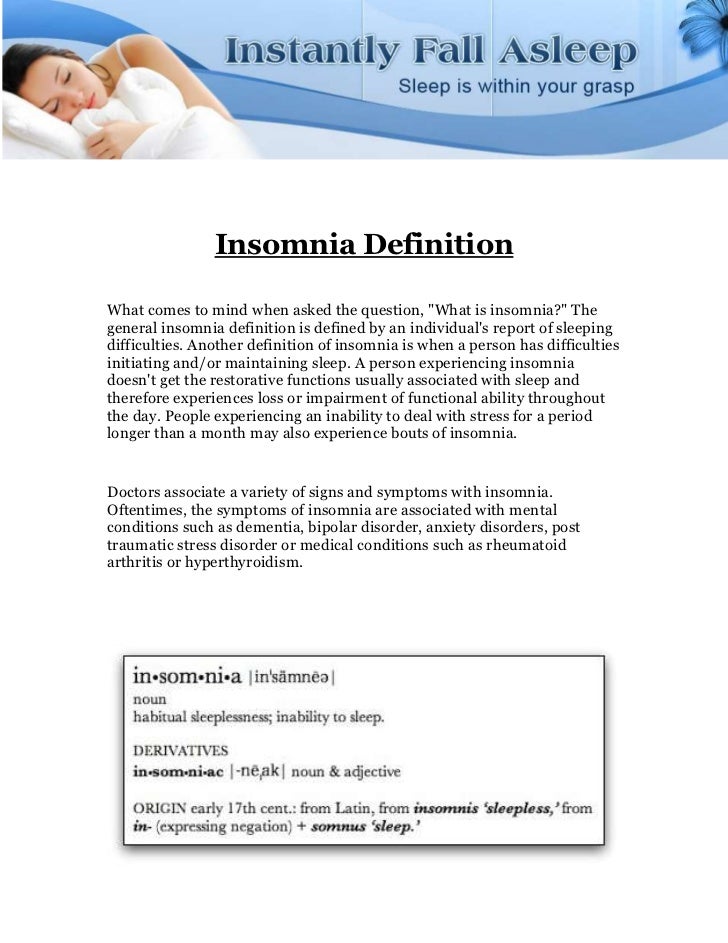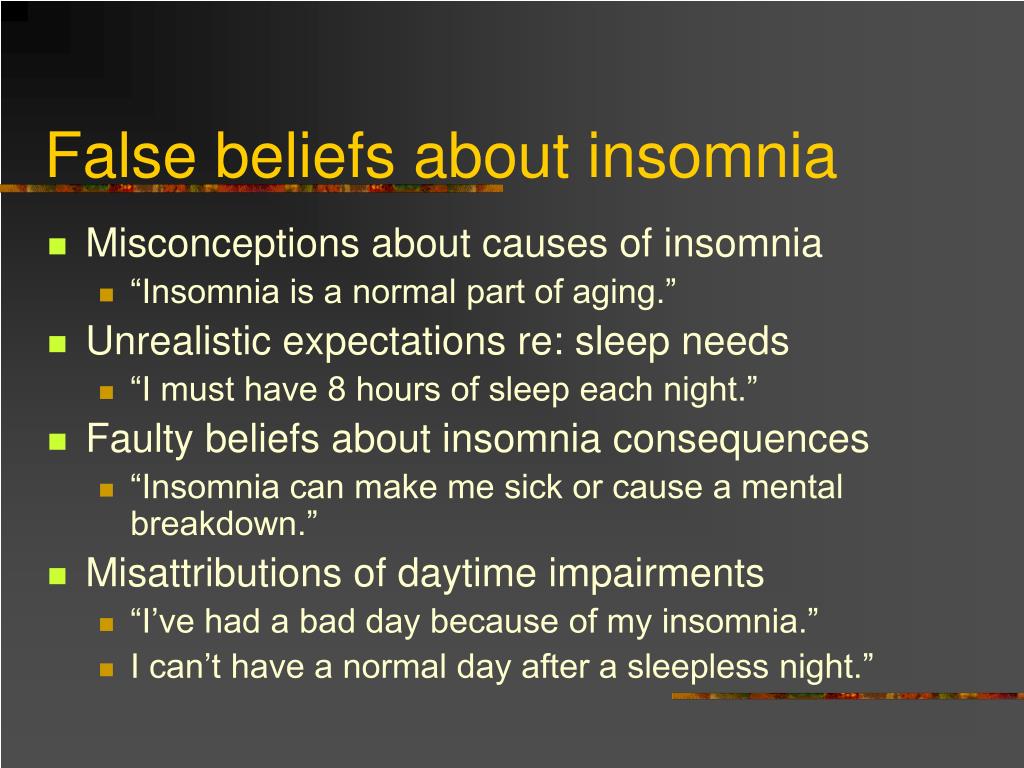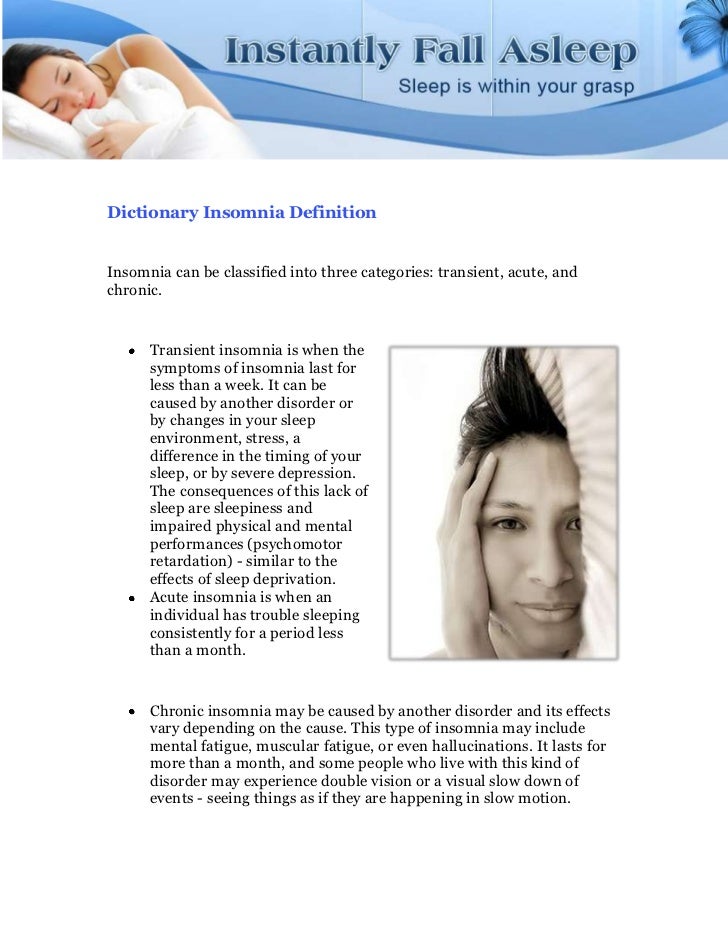

Quantitative electroencephalographic (EEG) analyses may indicate that individuals with insomnia have greater high-frequency EEG power relative to good sleepers both around the sleep onset period and during non-rapid eye movement sleep, a feature suggestive of increased cortical arousal. The severity of these sleep impairments does not always match the individual's clinical presentation or subjective complaint of poor sleep, as individuals with insomnia often underestimate sleep duration and overestimate wakefulness relative to polysomnography.

6Ī multimodal combination of treatments that include cognitive therapy around sleep and behavioral interventions (sleep restriction, stimulus control) and education (sleep hygiene).Polysomnography usually shows impairments of sleep continuity (e.g., increased sleep latency and time awake after sleep onset and decreased sleep efficiency (percentage of time in bed asleep) and may show increased stage 1 sleep and decreased stages 3 and 4 sleep. About one-third of adults report some insomnia symptoms, 10-15 percent report problems with functioning during the daytime and 6-10 percent have symptoms severe enough to meet criteria for insomnia disorder. The significance of SE is understandable because it captures a core problem for those suffering from insomniaspending too much time in bed trying to sleep. Techniques include challenging notions about requisite amounts of sleep, notions that sleep is out of their control, and fears about missed sleep thought journaling and behavioral experiments around sleep beliefs. Insomnia, the most common sleep disorder, involves problems getting to sleep or staying asleep. INTRODUCTION Sleep efficiency (SE), commonly defined as the ratio of total sleep time (TST) to time in bed (TIB), plays a central role in insomnia research and practice.

Dysfunctional beliefs create tension, impair sleep, and reinforce the beliefs. Definitions vary, but acute insomnia is typically considered to be insomnia lasting less than 4 weeks, occurring in response to an identifiable stressor. 6Īn intervention that aims to change how patients think about sleep by identifying, challenging, and replacing dysfunctional beliefs and attitudes. Insomnia is not explained by the presence of mental disorders or medical conditions and is not associated with another sleep-wake disorder. 6Ĭombines core behavioral interventions of stimulus control and sleep restriction. Techniques include progressive muscle relaxation, guided imagery, and paced breathing. Training to reduce somatic tension and control bedtime thought patterns that impair sleep. Techniques include setting strict bedtime and rising schedules, and keeping a set wakeup time, with modifications based on sleep efficiency after a certain duration of time. 6īehavioral intervention that limits time in bed to sleep time, gradually increasing time in bed as sleep efficiency improves. Management begins with consistent implementation of good sleep hygiene. Techniques include restricting bedroom for sleep only going to bed only when sleepy avoiding reading, television, phone, etc., in the bedroom leaving the bedroom when unable to sleep regular sleep schedule no snooze button. Behavioral insomnia of childhood is common and is characterized by a learned inability to fall and/or stay asleep. 6īehavioral treatment that aims to change behaviors associated with bed and bedroom and establish consistency in sleep patterns. Educational materials describe avoiding caffeine and nicotine, limiting consumption of alcoholic beverages, maintaining a regular sleep schedule, avoiding napping, exercising regularly, and maintaining a quiet and dark bedroom. The Penn State Health Sleep Research and Treatment Center is one of only a handful of national institutions.

Psychological and Behavioral Treatments for Insomniaīehavioral intervention aiming to educate patients about health and environmental factors they can change to improve sleep. Cognitive-Behavioral Treatment of Insomnia (CBT-I).


 0 kommentar(er)
0 kommentar(er)
